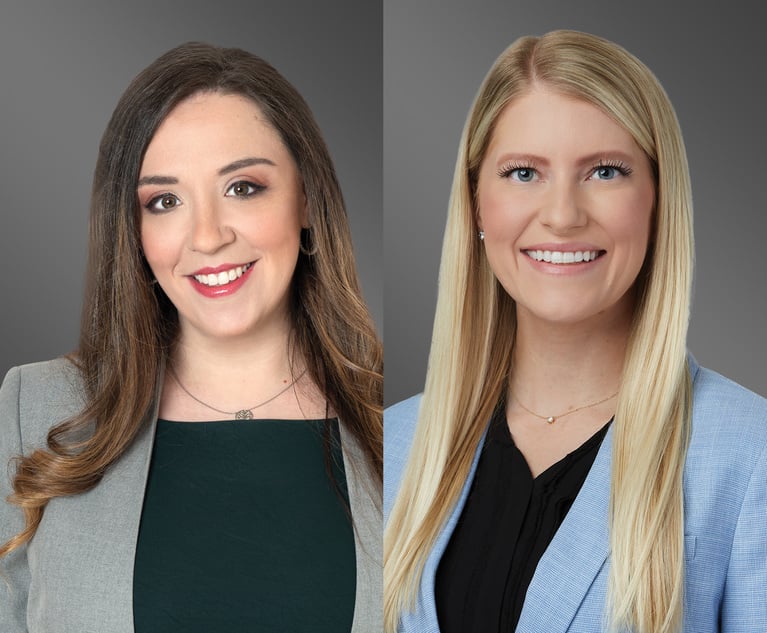Simple Ways to Limit the Risk of Legal Malpractice Claims
Review some easily implemented risk prevention tools that can help attorneys avoid the simple but serious mistakes.
December 04, 2018 at 10:56 AM
6 minute read
 Shari Klevens, left, and Alanna Clair, Dentons (photo: Courtesy Photo)
Shari Klevens, left, and Alanna Clair, Dentons (photo: Courtesy Photo)
As any attorney knows, the practice of law can require the consideration of complex issues and the exercise of judgment under difficult circumstances. Thus, many attorneys are surprised to learn that a significant number of legal malpractice claims each year arise from simple, easily preventable mistakes. While attorneys are focused on the many demands of practicing law, it can still happen that administrative tasks fall by the wayside, leading to claims.
The consequences can be serious. A missed deadline, an overlooked email, or the loss of confidential client information can all very easily lead to malpractice claims. Worse yet, each of those mistakes is typically easily digestible by a jury, certainly when compared to an alleged error in the exercise of judgment on a complex legal issue.
What each of these mistakes share in common is that, in some instances, they can be avoided or their impact reduced with a relatively small amount of effort. Below are some easily implemented risk prevention tools that can help attorneys avoid the simple but serious mistakes.
Use an Effective Docketing System
For many attorneys, their upcoming deadlines dictate their practice. The risk comes where attorneys' docketing systems fall short in establishing a foolproof system to prevent time-related errors. Missing a deadline or failing to attend to client interests or demands are easy targets for malpractice plaintiffs, even where no injury or damage results.
Even the most careful or experienced attorneys may inadvertently fail to comply with a deadline. Indeed, most attorneys have had the feeling of terror that a deadline may have been forgotten. However, by adopting a concrete system for docketing, attorneys are much more likely to prevent time-related errors.
Some attorneys think that they can simply remember every important deadline, while other attorneys rely on their email system to manage every aspect of their professional lives. Both of these approaches come with obvious risks, especially in light of the rise of electronic communication. Indeed, although time management is an old problem, it has taken on even greater importance now that attorneys might receive hundreds of electronic communications in a single day.
To avoid overlooking an important deadline, attorneys can employ and then re-evaluate their calendar or docket control system. Effective docket control systems should help, not hinder, the practice of law. If a docket control system is not helping an attorney track and manage deadlines, there may be a better system out there. A docketing system can be user-friendly, accurate, and reliable.
However, it is critical that attorneys actually use a docketing system, once in place. If documents or deadlines are not being fed to the docketing system, there is still a significant risk of missing a deadline—and receiving a claim.
Control Your Email Inbox
As noted above, the sheer quantity of emails received by attorneys can be staggering. Nonetheless, attorneys often attempt to use their email inbox as a kind of task list, which can be an imperfect method for ensuring that tasks are completed. In particular, it can be difficult at times to both view emails in a timely manner and, once viewed, remember them in order to ensure that important tasks and deadlines are not missed. Leaving emails unattended in an inbox, with the goal of “getting to them later,” can create unnecessary risk.
Handling and foldering messages appropriately can be of great assistance in this regard. Some firms will limit the number of emails that can be kept in an inbox, thereby encouraging lawyers to process emails in a more timely fashion.
Check Your Insurance Policy
Although the professional liability insurance market is constantly evolving, there are some law firms or practitioners who mindlessly renew their existing policy year after year without considering whether better terms are available or whether changes to their practice require revisions to their existing policy. Instead, some firms only pay attention to their insurance policy after a claim is made, when it is of course too late.
Rather than risk not having sufficient coverage for a claim, it is helpful to review an existing professional liability policy to identify any potential gaps and to fully consider whether the policy provides everything the attorney needs. Renewals should be fully reviewed and analyzed to make sure that there are no unnecessary holes in the coverage.
Consider Mobile Device Security
As modern technology has made the practice of law more efficient in many ways, it also has created new challenges for attorneys in complying with their duty to maintain client confidences and secrets. Every attorney is essentially carrying a full computer (and access to their firm's files) through the smartphone in their pocket.
To ensure that secrets are kept safe while using mobile devices, many law firms require the use of a passcode on the physical phone. In that way, if a phone is left on an airplane or in the back of a taxi, the finder is not automatically permitted into the firm's files and network.
Another helpful feature is the ability to “remote wipe” data from devices in the event the devices are lost or stolen. Others use programs that ensure that smartphone data is encrypted, or consider employing features such as GPS tracking and secure file sharing. The most effective or necessary methods can vary by firm or by client.
Consider Engagement Letters
For many firms, the use of engagement letters can help reduce malpractice claims or limit their scope. Engagement letters are helpful for several reasons, including because they can help avoid any misunderstandings regarding the identity of the client, the scope of representation, the duration of the representation, and the fees to be charged for the firm's services.
Depending on the circumstances, the use of a general engagement letter can suggest that the attorney agreed to advise the client on any and all legal issues faced by the client, far beyond the actual intended scope of the representation.
Because of the demands of practicing law, many attorneys feel that they do not have the time to focus on administrative tasks. However, without appropriate precautions, even the best attorneys can fall prey to legal malpractice claims arising out of easily preventable mistakes.
Shari L. Klevens is a partner at Dentons US and serves on the firm's US Board of Directors. She represents and advises lawyers and insurers on complex claims, is co-chair of Dentons' global insurance sector team, and is co-author of “California Legal Malpractice Law” (2014). Alanna Clair is a partner at Dentons US and focuses on professional liability defense. Shari and Alanna are co-authors of “The Lawyer's Handbook: Ethics Compliance and Claim Avoidance.”
This content has been archived. It is available through our partners, LexisNexis® and Bloomberg Law.
To view this content, please continue to their sites.
Not a Lexis Subscriber?
Subscribe Now
Not a Bloomberg Law Subscriber?
Subscribe Now
NOT FOR REPRINT
© 2025 ALM Global, LLC, All Rights Reserved. Request academic re-use from www.copyright.com. All other uses, submit a request to [email protected]. For more information visit Asset & Logo Licensing.
You Might Like
View All
What Will It Mean in California if New Federal Anti-SLAPP Legislation Passes?
9 minute read
For Growing Law Firms, Customizable Financing Can Unlock Opportunities
6 minute read
The Rise of Female Breadwinners: Challenging Traditional Divorce Dynamics
4 minute read
An Overview of Proposed Changes to the Federal Rules of Procedure Relating to the Expansion of Remote Trial Testimony
15 minute readTrending Stories
- 1We the People?
- 2New York-Based Skadden Team Joins White & Case Group in Mexico City for Citigroup Demerger
- 3No Two Wildfires Alike: Lawyers Take Different Legal Strategies in California
- 4Poop-Themed Dog Toy OK as Parody, but Still Tarnished Jack Daniel’s Brand, Court Says
- 5Meet the New President of NY's Association of Trial Court Jurists
Who Got The Work
J. Brugh Lower of Gibbons has entered an appearance for industrial equipment supplier Devco Corporation in a pending trademark infringement lawsuit. The suit, accusing the defendant of selling knock-off Graco products, was filed Dec. 18 in New Jersey District Court by Rivkin Radler on behalf of Graco Inc. and Graco Minnesota. The case, assigned to U.S. District Judge Zahid N. Quraishi, is 3:24-cv-11294, Graco Inc. et al v. Devco Corporation.
Who Got The Work
Rebecca Maller-Stein and Kent A. Yalowitz of Arnold & Porter Kaye Scholer have entered their appearances for Hanaco Venture Capital and its executives, Lior Prosor and David Frankel, in a pending securities lawsuit. The action, filed on Dec. 24 in New York Southern District Court by Zell, Aron & Co. on behalf of Goldeneye Advisors, accuses the defendants of negligently and fraudulently managing the plaintiff's $1 million investment. The case, assigned to U.S. District Judge Vernon S. Broderick, is 1:24-cv-09918, Goldeneye Advisors, LLC v. Hanaco Venture Capital, Ltd. et al.
Who Got The Work
Attorneys from A&O Shearman has stepped in as defense counsel for Toronto-Dominion Bank and other defendants in a pending securities class action. The suit, filed Dec. 11 in New York Southern District Court by Bleichmar Fonti & Auld, accuses the defendants of concealing the bank's 'pervasive' deficiencies in regards to its compliance with the Bank Secrecy Act and the quality of its anti-money laundering controls. The case, assigned to U.S. District Judge Arun Subramanian, is 1:24-cv-09445, Gonzalez v. The Toronto-Dominion Bank et al.
Who Got The Work
Crown Castle International, a Pennsylvania company providing shared communications infrastructure, has turned to Luke D. Wolf of Gordon Rees Scully Mansukhani to fend off a pending breach-of-contract lawsuit. The court action, filed Nov. 25 in Michigan Eastern District Court by Hooper Hathaway PC on behalf of The Town Residences LLC, accuses Crown Castle of failing to transfer approximately $30,000 in utility payments from T-Mobile in breach of a roof-top lease and assignment agreement. The case, assigned to U.S. District Judge Susan K. Declercq, is 2:24-cv-13131, The Town Residences LLC v. T-Mobile US, Inc. et al.
Who Got The Work
Wilfred P. Coronato and Daniel M. Schwartz of McCarter & English have stepped in as defense counsel to Electrolux Home Products Inc. in a pending product liability lawsuit. The court action, filed Nov. 26 in New York Eastern District Court by Poulos Lopiccolo PC and Nagel Rice LLP on behalf of David Stern, alleges that the defendant's refrigerators’ drawers and shelving repeatedly break and fall apart within months after purchase. The case, assigned to U.S. District Judge Joan M. Azrack, is 2:24-cv-08204, Stern v. Electrolux Home Products, Inc.
Featured Firms
Law Offices of Gary Martin Hays & Associates, P.C.
(470) 294-1674
Law Offices of Mark E. Salomone
(857) 444-6468
Smith & Hassler
(713) 739-1250






